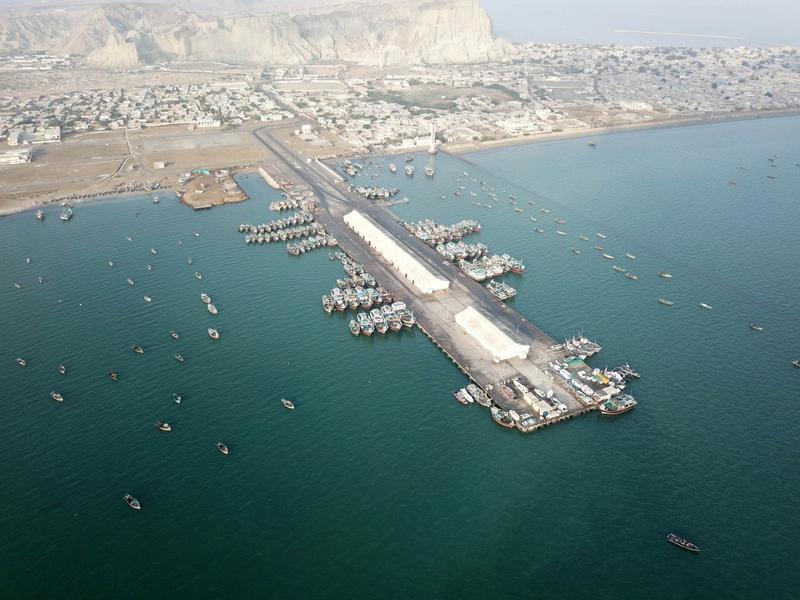 A general view of Gwadar port in Gwadar, Pakistan, in this January 29, 2018 file photo. (PHOTO / XINHUA)
A general view of Gwadar port in Gwadar, Pakistan, in this January 29, 2018 file photo. (PHOTO / XINHUA)
A publication in the United States has come under fire for falsely suggesting that China is building a naval base in Pakistan.
The COPHC is the holder of the concession agreement for Gwadar Port and the related Gwadar Free Trade Zone and Gwadar Marine Services, which is engaged in management, operational and investment activities
Forbes magazine, in its online edition dated June 2, ran a report under the headline: China's new high-security compound in Pakistan may indicate naval plans.
The report speculated on the purpose of construction work undertaken at Gwadar Port.
In response, the port operator refuted suggestions that the naval complex was being built, saying that the construction was for office buildings to be used by it and its partner companies. Sources say the operator is considering legal action against the publication, to safeguard its rights and interests.
The Forbes report said: "Analysts have been watching for the first signs of a long-expected Chinese naval base at Gwadar in Pakistan. The base, to complement an elaborate one in Djibouti, would strengthen China's foothold in the Indian Ocean.
"Recent satellite images appear to show that several new complexes have been built in the last few years. One of them, identified as being used by a Chinese company involved in port development, has unusually high security."
All the new complexes mentioned in the report turn out to be the office buildings cited by the port operator.
ALSO READ: China, Pakistan agree on further cooperation over CPEC
"We are stunned by the news published in Forbes" on June 2, said Zhang Baozhong, chairman and general manager of China Overseas Ports Holding Company, or COPHC, the overall operator of Gwadar Port.
"They referred to our office building allegedly being a naval complex, which is factually incorrect. The news report is factually wrong. Hence rejected."
The Forbes report identified China Communications Construction Company, or CCCC, as the user of a "high-security compound", erroneously interpreting the situation as the "first signs" of a "Chinese naval base".
The COPHC is the holder of the concession agreement for Gwadar Port and the related Gwadar Free Trade Zone and Gwadar Marine Services, which is engaged in management, operational and investment activities. The CCCC, the entity that the Forbes story said is using the compound, is a contractor for part of the construction of the trade zone.
"This news is obviously a misinformation that can sabotage our businesses roots and what we have been developing since the signed concession agreement. Such news is offensive," Zhang said.
Temporary offices
The COPHC has made progress with phase one of the trade zone and has already moved on to the second phase. The new buildings cited by the US report are for temporary offices and accommodation by investors and contractors with the sole purpose of serving the development of the port and the free-trade zone, Zhang said.
"Such reports have disappointed and discouraged the investors, holding back the development and progress of Gwadar," he said. "These reports are damaging our reputation."
The sources said that legal procedures could be initiated to protect the interests of the companies involved in the development of the port and the trade zone.
As for security, "everywhere in the world, you may see security at each entrance of every office, regardless of whether they are State-owned or private companies", Zhang said.
In Pakistan, from north to south, the presence of security personnel and private guards and the like are the norm, said Zhang, adding: "Everyone has the right to protect himself and the assets."
READ MORE: China-Pakistan ties on strong footing, Li says
Mustansar Abbas, an Islamabad-based researcher and analyst of international and maritime affairs, said Pakistan's armed forces are already providing security to projects along the China-Pakistan Economic Corridor, or CPEC, including the Gwadar Port. "Why would China establish a naval base here?"
Gwadar Port is a key project under the CPEC, said Zhang, adding that the hope is to develop Gwadar into an economic hub for Pakistan.
Last autumn, China said it had no intention of building a naval base at the Pakistani deep-sea port.
People involved in the Gwadar plans say that, since the COPHC began its involvement, the rumor mill has gone into overdrive, accompanied by incorrect media reports. Many media outlets in the West have left no stone unturned in their efforts to characterize the Chinese projects as controversial, they say.
"US opposition to the CPEC is known to Pakistan. And now US media is following the US government's footsteps in trying to make out that the CPEC is controversial," said Abbas.
The writer is a freelance journalist for China Daily.


